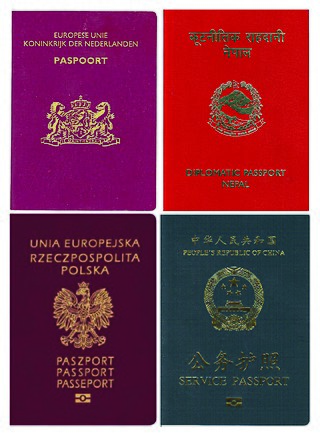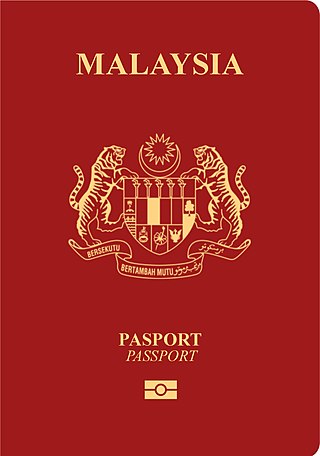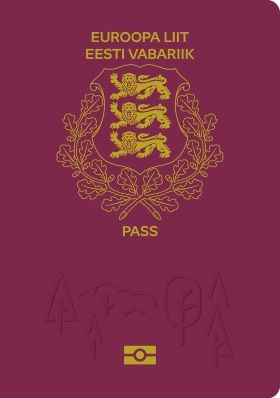
A passport is an official travel document issued by a government that certifies a person's identity and nationality for international travel. A passport allows its bearer to enter and temporarily reside in a foreign country, access local aid and protection, and obtain consular assistance from their government. In addition to facilitating travel, passports are a key mechanism for border security and regulating migration; they may also serve as official identification for various domestic purposes.

A visa is a conditional authorization granted by a polity to a foreigner that allows them to enter, remain within, or leave its territory. Visas typically include limits on the duration of the foreigner's stay, areas within the country they may enter, the dates they may enter, the number of permitted visits, or if the individual can work in the country in question. Visas are associated with the request for permission to enter a territory and thus are, in most countries, distinct from actual formal permission for an alien to enter and remain in the country. In each instance, a visa is subject to entry permission by an immigration official at the time of actual entry and can be revoked at any time. Visa evidence most commonly takes the form of a sticker endorsed in the applicant's passport or other travel document but may also exist electronically. Some countries no longer issue physical visa evidence, instead recording details only in immigration databases.

The Hong Kong Special Administrative Region passport is a passport issued only to permanent residents of Hong Kong who also hold Chinese citizenship. In accordance with the Basic Law of the Hong Kong Special Administrative Region, since the handover in 1997, the passport has been issued by the Immigration Department of the Government of Hong Kong under the authorisation of the Central People's Government of the People's Republic of China. As the official languages of Hong Kong are Chinese and English, the passport is printed bilingually in both Chinese and English. In addition, unlike Chinese passport which can be issued by Chinese diplomatic missions abroad, the Immigration Department of Hong Kong is the only issuing authority for HKSAR passports.

The British passport is a travel document issued by the United Kingdom or other British dependencies and territories to individuals holding any form of British nationality. It grants the bearer international passage in accordance with visa requirements and serves as proof of citizenship. It also facilitates access to consular assistance from British embassies around the world. Passports are issued using royal prerogative, which is exercised by His Majesty's Government; this means that the grant of a passport is a privilege, not a right, and may be withdrawn in some circumstances. British citizen passports have been issued in the UK by His Majesty's Passport Office, an agency of the Home Office, since 2014. All passports issued in the UK since 2006 have been biometric.

The Malaysian passport is the passport issued to citizens of Malaysia by the Immigration Department of Malaysia. The main legislation governing the production of passports and travel documents, their possession by persons entering and leaving Malaysia, and related matters is the Passport Act 1966.

Hungarian passports are issued to Hungarian citizens for international travel by The Central Data Processing, Registration and Election Office of the Hungarian Ministry of the Interior. Every Hungarian citizen is also a citizen of the European Union. The passport, besides the national identity card allows for free rights of movement and residence in any of the states of the European Union, European Economic Area and Switzerland.

The Singapore passport is a passport issued to citizens of the Republic of Singapore. It enables the bearer to exit and re-enter Singapore freely; travel to and from other countries in accordance with visa requirements; facilitates the process of securing assistance from Singapore consular officials abroad, if necessary; and requests protection for the bearer while abroad.

Argentine passport are issued to citizens of Argentina by the National Registry for People (ReNaPer). They were issued exclusively by the Argentine Federal Police up to 2011. Their primary use is to facilitate international travel.

The Mexican passport is the passport issued to Mexican citizens for the purpose of travelling abroad. The Mexican passport is also an official ID and proof of Mexican citizenship. According to the January 2024 Henley Visa Restrictions Index, holders of a Mexican passport can visit 161 countries without a visa, placing Mexico in the 23rd rank in terms of global travel freedom.

A German passport is an identity document issued to nationals of Germany for the purpose of international travel. A German passport is, besides the German ID card and the German Emergency Travel Document, the only other officially recognised document that German authorities will routinely accept as proof of identity from German citizens. Besides serving as proof of identity and presumption of German nationality, they facilitate the process of securing assistance from German consular officials abroad. German passports are valid for ten years or six years and share the standardised layout and burgundy red design with other EU passports. Every German citizen is also a citizen of the European Union. The passport, along with the national identity card, allows for free rights of movement and residence in any of the states of the European Union, European Economic Area and Switzerland.

An Estonian passport is an international travel document issued to citizens of Estonia, and may also serve as proof of Estonian citizenship. Besides enabling the bearer to travel internationally and serving as indication of Estonian citizenship, the passport facilitates the process of securing assistance from Estonian consular officials abroad or other European Union member states in case an Estonian consular is absent, if needed. If an Estonian citizen wishes to receive an identity document, especially an Estonian passport, somewhere other than the foreign representation of the Republic of Estonia, then the bearer of the Estonian citizenship staying abroad could receive the travel documents in embassies of any EU country worldwide by paying 50 Euro. Many countries require passport validity of no less than 6 months and one or two blank pages.

Vietnamese passports are issued to citizens of Vietnam to facilitate international travel. They enable the bearer to exit and re-enter Vietnam freely; to travel to and from other countries in accordance with visa requirements, and secure assistance from Vietnamese consular officials when abroad, if necessary.

Brazilian passport is the official document for foreign travel issued by the federal government, through the Federal Police.

The Djiboutian passport is issued to citizens of Djibouti for international travel. The document is a biometric machine-readable passport with a blue cover with the text "République de Djibouti" above the coat of arms, and the text "passport" below it in Arabic and French. The passport is valid for 5 years and contains 31 pages. The passport includes the full name, photograph, signature and date of birth of the holder. The newer passports offer better security and state-of-the-art anti forging parameters and have a soft cover.

An Estonian temporary travel document is a travel document issued to an alien staying in Estonia for departure from and return to Estonia. A temporary travel document may be issued, without a standard application, to an alien who departs or is obliged to depart from Estonia without the right of return if he or she does not hold a valid travel document or a certificate of return issued by a foreign state. A temporary travel document for a single departure from and return to Estonia may be issued to an alien legally residing in Estonia if he or she does not hold a valid travel document and does not have the right to receive an alien’s passport. A temporary travel document does not grant the holder thereof the right to protection by a foreign mission of Estonia unless otherwise provided by law or a treaty. A temporary travel document shall be issued with a period of validity of up to two years.

The visa policy of Canada requires that any foreign citizen wishing to enter Canada must obtain a temporary resident visa from one of the Canadian diplomatic missions unless they hold a passport issued by one of the 53 eligible visa-exempt countries and territories or proof of permanent residence in Canada or the United States.
The Home Office travel document is an international travel document issued by the UK Border Agency to an alien resident of United Kingdom who is unable to obtain a national passport. It is usually valid for five years, or if the holder only has temporary permission to stay in the United Kingdom, the validity will be identical to the length of stay permitted.

The Canadian Certificate of Identity is an international travel document issued by Immigration, Refugees and Citizenship Canada to a permanent resident of Canada who is not yet a Canadian citizen, is stateless, or is otherwise unable to obtain a national passport or travel document. It is a biometric document with a grey cover and is bilingual in both English and French. The validity period of the travel document is determined by the issuing office.

The British National (Overseas) passport, commonly referred to as the BN(O) passport, is a British passport for people with British National (Overseas) status. BN(O) status was created in 1987 after the enactment of Hong Kong Act 1985, whose holders are permanent residents of Hong Kong who were British Overseas Territories citizens until 30 June 1997 and had registered as BN(O)s.

The Australian Certificate of Identity (COI) is a biometric travel document issued by the Department of Foreign Affairs and Trade to individuals who are not Australian citizens and are about to leave Australia or one of its territories.

















